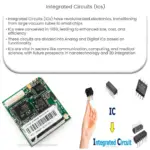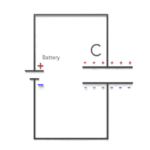Integrated circuits are compact electronic devices with interconnected components on a semiconductor, enabling complex and efficient systems.
Introduction to Integrated Circuits (ICs)
Integrated circuits (ICs) are compact electronic devices that contain multiple interconnected components, such as transistors, resistors, diodes, and capacitors, fabricated on a single piece of semiconductor material. This miniaturization of electronic circuits enables the creation of complex and efficient systems on a microscopic scale.
History of Integrated Circuits
The invention of the integrated circuit in the late 1950s by Jack Kilby and Robert Noyce revolutionized the electronics industry. Their innovation allowed for the development of smaller, faster, and more reliable electronic devices, ultimately leading to the rapid advancement of technology we witness today.
Types of Integrated Circuits
Integrated circuits can be broadly categorized into two types:
- Analog ICs: These circuits process continuous signals, such as audio or temperature, and are commonly used in amplifiers, oscillators, and filters.
- Digital ICs: Designed to handle discrete signals, digital ICs operate using binary logic (0s and 1s). Examples include microprocessors, memory chips, and logic gates.
Some ICs, called mixed-signal ICs, combine both analog and digital functions on a single chip.
Manufacturing Process
Integrated circuits are produced using a process called photolithography, which involves layering and etching patterns onto a thin wafer of semiconductor material, typically silicon. This process requires a high level of precision and is carried out in cleanroom environments to prevent contamination by dust particles.
Advantages of Integrated Circuits
- Size: ICs are significantly smaller than discrete circuits, allowing for more compact and portable electronic devices.
- Cost: Mass production of ICs reduces the cost per unit, making electronic devices more affordable.
- Performance: Due to their compact size, ICs have shorter internal connections, which result in faster operation and reduced signal loss.
- Reliability: Integrated circuits have fewer interconnections, which reduces the probability of connection failures and improves overall reliability.
- Power Consumption: ICs consume less power compared to discrete circuits, leading to increased energy efficiency and longer battery life in portable devices.
Applications of Integrated Circuits
Integrated circuits have become an essential component of modern electronic devices, such as computers, smartphones, televisions, and many others. They are also widely used in medical equipment, automotive systems, and aerospace technologies, making them indispensable in our daily lives.
.png)



